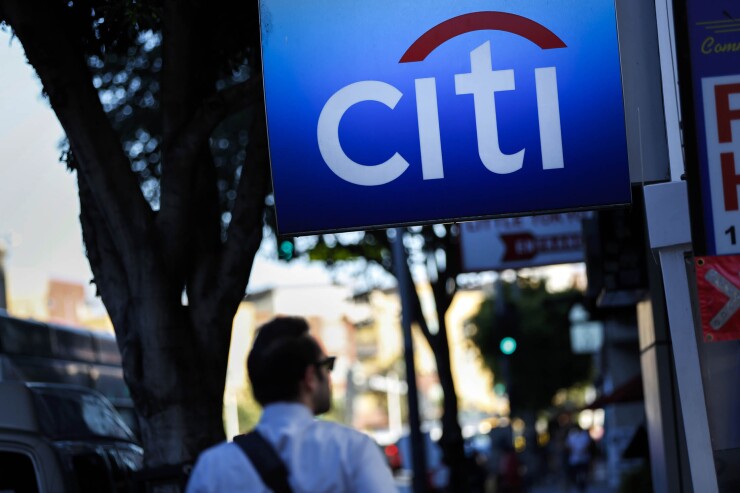
As banks increasingly take the reins in buy now/pay later lending, Citigroup is going a step farther by introducing multiple point-of-sale finance options to appeal to merchants.
Citi Retail Services is adding financing choices at the point of sale through its Citi Pay brand. The bank is competing against other banks and large payment companies that are expanding their own point-of-sale financing options as the fintechs that traditionally dominated the market struggle.
"Citi and other large banks are probably better positioned to offer point-of-sale lending or BNPL," said David Shipper, a strategic advisor in Aite-Novarica's payments and banking practice. "Banks can play here."
The first point-of-sale financing product from Citi Pay, Citi Pay Credit, is a digital credit card and line of credit. City Pay Credit enables merchants to offer promotional financing, and consumers can opt in for a purchase plan based on what the retailer offers. This product is distinct from Citi credit cards and is designed for larger purchases at the bank's merchant partners.
Consumers can apply for Citi Pay Credit within the checkout process at retailers and receive a credit and authorization decision before paying. In the coming months, Citi Pay will introduce installment loans, which enable consumers to pay through monthly payments over a period of six to 60 months based on the retailer's policies and type of purchase.
"Citi is intending to support multiple business models, from a revolving line of credit like a private-label store care to a 'pay in 4' model like products from PayPal, Affirm and others," said Aaron McPherson, a principal at AFM Consulting Partners.
Citi already offers BNPL through Citi Flex Pay. Citi recently signed a partnership with
The newer Citi Pay releases add point-of-sale financing options as part of embedded payments, or a strategy that relies on enrolled payment credentials as a way to add more financial services or a path to buy other products from non-financial services providers.
Banks that have a merchant services division or product can pair BNPL with other financial products for retailers, Shipper said.
Citi's growing range of point of sale credit options is the culmination of a trend of large banks seeking to compete in the buy now/pay later lending space, sensing opportunity as some of the fintechs that originated in the space struggle, according to McPherson.
The fintechs that dominated BNPL's early growth in the U.S. in 2020 and 2021
Banks and the credit card networks have stepped up their game in the current environment, offering BNPL as part of a larger range of fully-regulated payment choices. Citizens, which has offered installment lending for smartphones for years, has expanded its point-of-sale credit lending to include products such as
Apple also recently introduced
The companies are attracted to a market that, despite the economic and regulatory challenges to fintechs, is popular, particularly among coveted younger consumers.
Sixty percent of Generation Z and 66% of millennials report being likely to use BNPL, according to research from
Banks will be challenged to balance demand for BNPL with traditional credit cards, according to Shipper. While there isn't hard data, consumers who are presented with a credit card alternative tend to make that choice rather than the traditional credit card, he said. "If there is a better rate or a promotion around it, then consumers will choose that."
As banks move deeper into BNPL, another challenge they may face is managing a potential demand drop off that could come through tighter underwriting for BNPL loans. PayPal does a "soft" credit check for BNPL that doesn't impact a consumer's credit score, while Block's Afterpay does not do a credit check, according to Arizent's research.
"One of the reasons BNPL was so popular, and later problematic, was the willingness to grant credit to underserved consumers," McPherson said.
While the theory was that a limited line of credit without a revolving feature would keep borrowers from overextending, competition led to consumers being able to acquire multiple BNPL loans at once, which McPherson said undermined the risk model.
"If Citi seeks to avoid this problem by checking whether consumers already have BNPL loans outstanding, then its impact on the market will be muted," McPherson said.






